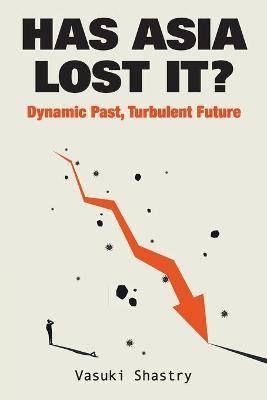Has Asia Lost It?: Dynamic Past, Turbulent Future

Has Asia Lost It?: Dynamic Past, Turbulent Future
''Shastry's polemic cites extensive research from experts and exploits the author's knowledge of Asia and his connections to the region's elite, with whom he rubs shoulders at Davos and other summits. What shows through in the book though is Shastry's compassion for the continent's ordinary people.'IMF F&D MagazineAsia has been the greatest show on earth since Japan's rise from the ashes of World War II, accompanied in successive decades with the emergence of the Asian tigers, and eventually the two giants China and India. The Asian miracle has few precedents in the modern era, with billions lifted from poverty in a generation. The region's openness to trade and investment aligned perfectly with the tailwinds of globalisation. However, in recent years Asia has become a victim of its own success with commentators not differentiating between a utopian high-income Asia and a dystopian middle- and low-income Asia, where a significant majority of the region's population live. Asia today can be divided into countries which have a lot, have a little, and have none. The continent's dream run is also coming to an end as Covid-19 exposes sharp weaknesses in state capacity and structural challenges like the U.S.-China trade war is putting globalisation into reverse gear, jeopardising the region's hard-earned economic success. Asia's growth-obsessed policymakers have also ignored social pressures from the impact of technology on jobs, rising inequality, fabulous wealth accumulation by a favoured billionaire class, a deepening demographic divide, climate distress, and gender disparity, which threaten to destabilise the region's famed cohesiveness. In his penetrating new book, well-known Asia expert Vasuki Shastry argues that while Asia's reckoning may have been the subject of speculation before the pandemic, Covid-19 has made that inevitable. Inspired by Dante's Inferno, Shastry takes readers on a journey through modern Asia's eight circles of hell where we encounter urban cowboys and cowgirls fleeing rural areas to live in increasingly uninhabitable cities, disadvantaged teenage girls unable to meet their aspirations due to social strictures, internal mutiny, messy geopolitics from the rise of China, and a political and business class whose interests are in conflict with a majority of the population. Shastry challenges conventional thinking about Asia's place in the world and the book is essential reading for those with an interest in the continent's future.Relate
PRP: 225.00 Lei
Acesta este Prețul Recomandat de Producător. Prețul de vânzare al produsului este afișat mai jos.
180.00Lei
180.00Lei
225.00 LeiLivrare in 2-4 saptamani
Descrierea produsului
''Shastry's polemic cites extensive research from experts and exploits the author's knowledge of Asia and his connections to the region's elite, with whom he rubs shoulders at Davos and other summits. What shows through in the book though is Shastry's compassion for the continent's ordinary people.'IMF F&D MagazineAsia has been the greatest show on earth since Japan's rise from the ashes of World War II, accompanied in successive decades with the emergence of the Asian tigers, and eventually the two giants China and India. The Asian miracle has few precedents in the modern era, with billions lifted from poverty in a generation. The region's openness to trade and investment aligned perfectly with the tailwinds of globalisation. However, in recent years Asia has become a victim of its own success with commentators not differentiating between a utopian high-income Asia and a dystopian middle- and low-income Asia, where a significant majority of the region's population live. Asia today can be divided into countries which have a lot, have a little, and have none. The continent's dream run is also coming to an end as Covid-19 exposes sharp weaknesses in state capacity and structural challenges like the U.S.-China trade war is putting globalisation into reverse gear, jeopardising the region's hard-earned economic success. Asia's growth-obsessed policymakers have also ignored social pressures from the impact of technology on jobs, rising inequality, fabulous wealth accumulation by a favoured billionaire class, a deepening demographic divide, climate distress, and gender disparity, which threaten to destabilise the region's famed cohesiveness. In his penetrating new book, well-known Asia expert Vasuki Shastry argues that while Asia's reckoning may have been the subject of speculation before the pandemic, Covid-19 has made that inevitable. Inspired by Dante's Inferno, Shastry takes readers on a journey through modern Asia's eight circles of hell where we encounter urban cowboys and cowgirls fleeing rural areas to live in increasingly uninhabitable cities, disadvantaged teenage girls unable to meet their aspirations due to social strictures, internal mutiny, messy geopolitics from the rise of China, and a political and business class whose interests are in conflict with a majority of the population. Shastry challenges conventional thinking about Asia's place in the world and the book is essential reading for those with an interest in the continent's future.Relate
Detaliile produsului










